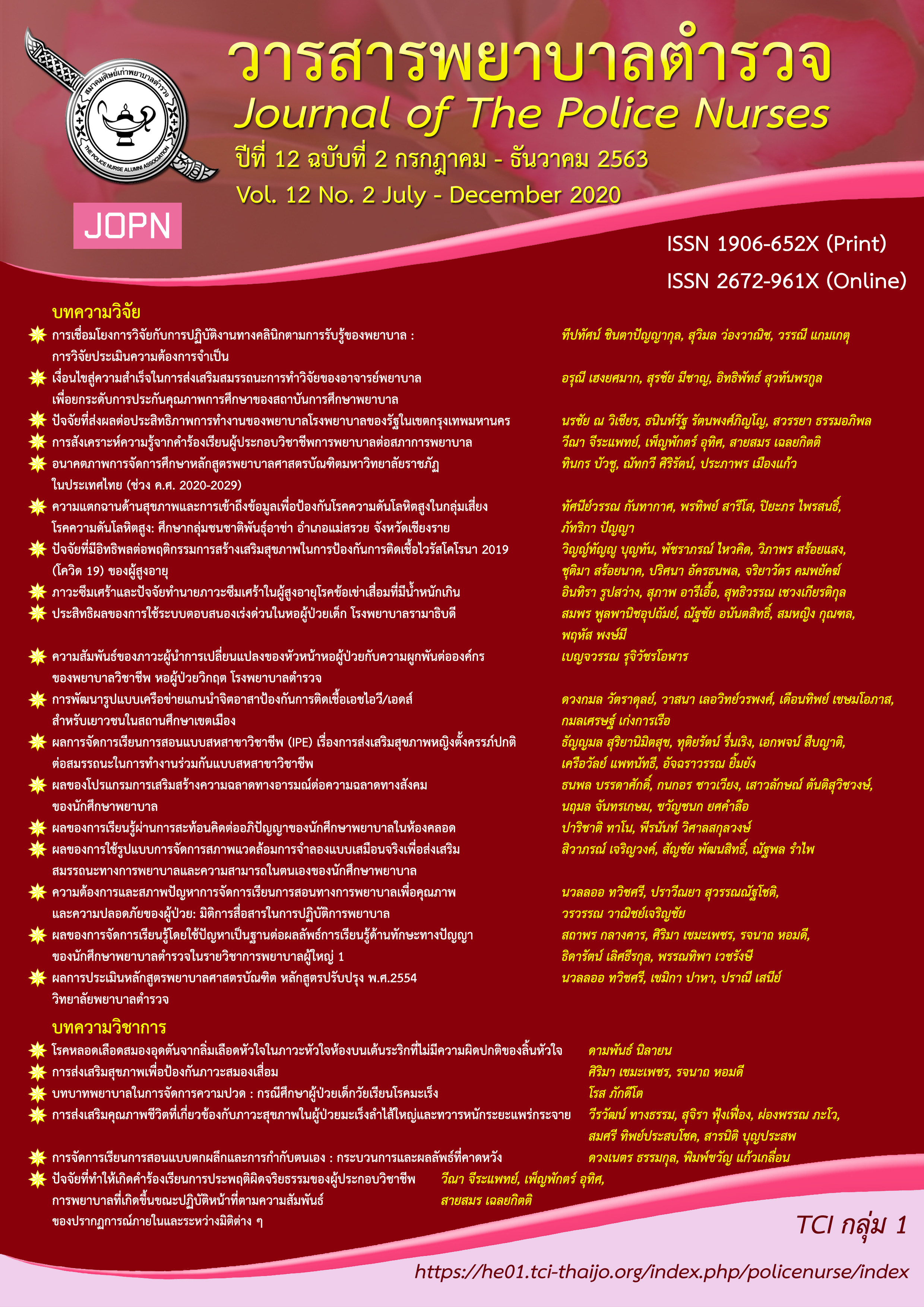FACTORS CAUSING COMPLAINTS ABOUT UNETHICAL BEHAVIOR OF NURSES THAT OCCURRED WHILE PERFORMING DUTIES DUE TO THE RELATIONSHIPS OF INTERNAL AND INTER-DIMENSIONAL PHENOMENA
Keywords:
factors causing complaints, unethical behavior, nursesAbstract
There are 3 key causal factors leading to complaints and professional misbehaviors: (1) Individual factors, mainly derive from practitioners’ mental and thinking process (active errors) e.g. forgetting, ignoring/neglecting, or lacking mindfulness. Importantly, such factors may also be caused by emotional quotient problems. Fifty six percentages of those committed cases were from professional misbehaviors under professional standards and service behaviors and offenses against other colleagues/ practitioners that involved loss of emotional self-control due to angry, for example, impolite verbal expression and violent behaviors. Next, (2) organization-related factors are the latent factors in the vulnerable work environment, in which patient safety issues can happen (latent errors). An important cause is the performance of duties in an organization where manpower management fails to comply with the standards of the Thailand Nursing and Midwifery Council on Nurse-Patient Ratio (ratio of not over 1:4). For example, the performance of afternoon shift duties in a medical ward at the nurse-patient ratio of 1:18, daily working hours exceeding 12 hours, and the need to work on the next day’s shift. Besides, the mixed manpower with vague job descriptions and organizational culture in taking oral medical instructions during non-emergencysituations were also found. Finally, (3) complainant factors which main motives for filing complaints are: (a) dissatisfaction with impolite/confronting communication behaviors, ignorance to service demands and threatening gestures upon the patient’s refusal to receive services, (b) dissatisfaction with the abuses in light of waste of time and money, violent behaviors, and fear of repeated acts, and (c) physical effects on patients/victims owing to unethical behaviors resulting in their suffering from critical conditions, need of long-term corrective treatment, permanent negative physical effects, or loss of life.
Downloads
References
Bennett, S., Tooth, L., McKenna, K., Rodger, S., Strong, J., Ziviani, J., . . . Gibson, L. (2003). Perceptions of evidence-based practice: A survey of Australian occupational therapists. Australian Occupational Therapy Journal, 50(1), 13-22.
Borhani, F., Alhani, F., Mohammadi, E., & Abbaszade, A. (2011). Nursing students’ perceived of barriers to professional ethics obtaining: A qualitative study. Strides in Development of Medical Education, 8(1), 67-80.
Borhani, F., Abbaszade, A., & Mohsenpour, M. (2001). Nursing students’ perceived of barriers to professional ethics sensitivity: A qualitative study. The Journal of Medical Ethics and History of Medicine, 5(16), 84-104.
Centre for Healthcare Improvement. (2012). Compliments and complaints. Brisbane: Centre for Healthcare Improvement. Retrieved from http://www.health.qld.gov.au/psq/hemt/complaints.asp
Customer expressions. (2012). Complaint management system checklist: Evaluate your complaint management system. Retrieved from http://www.customerexpressions.com/cex/cexweb.nsf/(GetPages)/D92706C67BCC79DD85256FF2006C0C88
Drake, C. L., Roehrs, T., Richardson, G., Walsh, J. K., & Roth, T. (2004). Shift work sleep disorder: Prevalence and consequences beyond that of symptomatic day workers. Sleep, 27(8), 1453-1462.
Ertuğ, N., Aktaş, D., Faydali, S., & Yalçin, O. (2014). Ethical sensitivity and related factors of nurses working in the hospital settings. Acta Bioethica, 20(2). Retrieved from https://revistas.uchile.cl/index.php/AB/article/view/33308
Friele, R. D., Sluijs, E. M., & Legemaate, J. (2008). Complaints handling in hospitals: An empirical study of discrepancies between patients' expectations and their experiences. BMC Health Services Research, 8(1), 199.
Fry, S., Veatch, R. M., Taylor, C., & Taylor, C. R. (2010). Case studies in nursing ethics (4th ed.). MA: Sudbury, Jones & Bartlett Learning.
Government gazette. (2007a). Constitution of the kingdom of THAILAND (B.E. 2550) category 3 rights and liberties of people in Thailand. episode 47ก, 7.
Government gazette. (2007b). Professional nursing and midwifery act, B.E. 2528 “nursing council regulations on restrictions and conditions in the nursing and midwifery licensure B.E.2550”. Special episode 83ง.
Government gazette. (2007c). Regulations of the nursing council about to keep ethics in the nursing and midwifery professionals 2007. Special episode 83ง, No. 124, 56.
Hernández-Cruz, R., Moreno-Monsiváis, M. G., Cheverría-Rivera, S., & Díaz-Oviedo, A. (2017). Factors influencing the missed nursing care in patients from a private hospital. Revista Latino-Americana de Enfermagem, 25. Retrieved from http://www.scielo.br/scielo.php?script=sci_abstract&pid=S0104-11692017000100354&lng=en&nrm=iso&tlng=es
Hwang, J. I., & Hwang, E. J. (2011). Individual and work environment characteristics associated with error occurrences in Korean public hospitals. Journal of Clinical Nursing, 20(21-22), 3256-3266.
Khunkitti, W., & Nusri-un, N. 2016 Attitudes of physicians and nurses towards the risk factors of complaint: Study in the North-Eastern Region of Thailand. Srinagarind Medical Journal, 31 (4), 231–236.
Knupp, A. M., Patterson, E. S., Ford, J. L., Zurmehly, J., & Patrick, T. (2018). Associations among nurse fatigue, individual nurse factors, and aspects of the nursing practice environment. The Journal of Nursing Administration, 48(12), 642-648.
Merakou, K., Dalla-Vorgia, P., Garanis-Papadatos, T., & Kourea-Kremastinou, J. (2001). Satisfying patients’ rights: A hospital patient survey. Nursing ethics, 8(6), 499-509.
Ezzatabadi, M. R., Bahrami, M. A., Hadizadeh, F., Arab, M., Nasiri, S., Amiresmaili, M., & Tehrani, G. A. (2012). Nurses' emotional intelligence impact on the quality of hospital services. Iranian Red Crescent Medical Journal, 14(12), 758-763.
Seki, Y., & Yamazaki, Y. (2006). Effects of working conditions on intravenous medication errors in a Japanese hospital. Journal of nursing management, 14(2), 128-139.
Shahvali, E. A., Mohammadzadeh, H., Hazaryan, M., & Hemmatipour, A. (2018). Investigating the relationship between nurses' moral sensitivity and patients' satisfaction with the quality of nursing care. Eurasian Journal of Analytical Chemistry, 13(3), em12.
The Justice Group. (2007). The constitution of the kingdom of Thailand. Bangkok: Foreign Law Bureau, Office of the Council of State.
Ulrich, C. M., Taylor, C., Soeken, K., O’Donnell, P., Farrar, A., Danis, M., & Grady, C. (2010). Everyday ethics: Ethical issues and stress in nursing practice. Journal of advanced nursing, 66(11), 2510-2519.
Weaver, K., & Morse, J. M. (2006). Pragmatic utility: Using analytical questions to explore the concept of ethical sensitivity. Research and theory for nursing practice, 20(3), 191-214.
Williams, T. (1996). Dealing with customer complaints. Gower Pub Co Ltd.
Downloads
Published
How to Cite
Issue
Section
License
ผลงานที่ได้ตีพิมพ์แล้วจะเป็นลิขสิทธิ์ของวารสารพยาบาลตำรวจ















